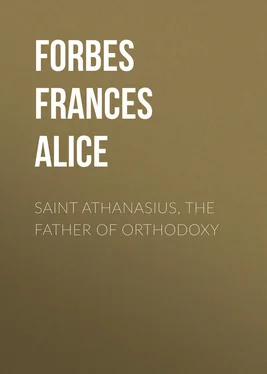Frances Forbes - Saint Athanasius, the Father of Orthodoxy
Здесь есть возможность читать онлайн «Frances Forbes - Saint Athanasius, the Father of Orthodoxy» — ознакомительный отрывок электронной книги совершенно бесплатно, а после прочтения отрывка купить полную версию. В некоторых случаях можно слушать аудио, скачать через торрент в формате fb2 и присутствует краткое содержание. Жанр: foreign_religion, foreign_antique, foreign_prose, на английском языке. Описание произведения, (предисловие) а так же отзывы посетителей доступны на портале библиотеки ЛибКат.
- Название:Saint Athanasius, the Father of Orthodoxy
- Автор:
- Жанр:
- Год:неизвестен
- ISBN:нет данных
- Рейтинг книги:4 / 5. Голосов: 1
-
Избранное:Добавить в избранное
- Отзывы:
-
Ваша оценка:
- 80
- 1
- 2
- 3
- 4
- 5
Saint Athanasius, the Father of Orthodoxy: краткое содержание, описание и аннотация
Предлагаем к чтению аннотацию, описание, краткое содержание или предисловие (зависит от того, что написал сам автор книги «Saint Athanasius, the Father of Orthodoxy»). Если вы не нашли необходимую информацию о книге — напишите в комментариях, мы постараемся отыскать её.
Saint Athanasius, the Father of Orthodoxy — читать онлайн ознакомительный отрывок
Ниже представлен текст книги, разбитый по страницам. Система сохранения места последней прочитанной страницы, позволяет с удобством читать онлайн бесплатно книгу «Saint Athanasius, the Father of Orthodoxy», без необходимости каждый раз заново искать на чём Вы остановились. Поставьте закладку, и сможете в любой момент перейти на страницу, на которой закончили чтение.
Интервал:
Закладка:
F. A. Forbes
Saint Athanasius, the Father of Orthodoxy
"Jesus said to them: Amen, Amen I say to you, before Abraham was
made, I am."
– John 8:58
"In the beginning was the Word, and the Word was with God, and the
Word was God. The same was in the beginning with God… And the
Word was made flesh, and dwelt among us."
– John 1:14
Nihil Obstat: J.N. Strassmaier, S.J.
Censor Deputatus
Imprimatur: Edmund Canon Surmont
Vicar General
Westminster
August 5, 1919
Originally published in 1919 by R. & T. Washbourne, Ltd., London, as part of the series Standard-bearers of the Faith: A Series of Lives of the Saints for Young and Old .
"Born of the Father before all ages, God of God, Light of Light,
true God of true God, begotten not made, consubstantial with the
Father.. "
– From the Nicene Creed
"I and the Father are one."
– Words of Our Lord (John 10:30)
Chapter 1 A FORESHADOWING
THE Patriarch of Alexandria, Egypt was expecting company. He stood at the window of his palace looking down the long road, that at the first sign of his guests' arrival he might go forth and welcome them. Before him, like a white pearl in the blue waters of the Mediterranean, lay the city of Alexandria – "the beautiful," as men loved to call it. Across the harbor the marble tower of the great lighthouse soared up into the clear Eastern sky, white as the white cliffs of the Island of Pharos from which it sprang. It was noonday, and the sunshine lay like a veil of gold over all.
The Patriarch's thoughts were wandering in the past. He had been celebrating the anniversary of his holy predecessor Peter, the previous Bishop, who had won the crown of martyrdom during the terrible persecution of the Christians not so many years before. Several of the clergy present had come from afar to assist at the festival, and these were to be his expected guests.
The time of suffering was past and over, and yet it seemed to Alexander as if it had all happened yesterday and might happen again tomorrow. There stood the great palace of the Caesars, where the pagan emperor had sat in judgment upon the lambs of Christ's flock; there the famous temple of Serapis, where the Christians had been dragged to offer incense to the gods; there the amphitheater where they had been torn to pieces by beasts and slain with the sword for confessing the Name of Christ. And all through those dark days, firm and steadfast as the lighthouse on the cliffs of Pharos, had stood the Patriarch Peter, a tower of strength and comfort to his persecuted children.
A hundred Bishops and more had looked to him as their head, for the See of Alexandria in the East was second only to that of Rome in the West, and the burden of responsibility was heavy. But, thanks to the example of its chief, the Church in Egypt had borne the trial bravely, and if some had quailed before the torture and the rack and had fallen away, by far the greater number had been true. Even the unheroic souls, who had loved their lives better than their God, had not been lost beyond hope, for they had come back during the lulls in the storm, begging to be absolved from their sin. And Peter, mindful of his Master's words that he should not quench the smoking flax nor break the bruised reed, received them back, after they had done penance, into the fold of Christ with mercy and compassion.
There were some who had not scrupled to protest against such mercy. "Were these apostates," cried Meletius, Bishop of Lykopolis, "to be made equal to those who had borne the burden and the heat of the day?" And he had rebelled against the decision of the Patriarch and made a schism in the Church. Even the martyrdom of the holy Peter had not brought him back to his allegiance: the Meletians were rebels still, to the crying scandal of Christians and pagans alike.
They were a hard people to govern, these Alexandrians – subtle, passionate and unstable, ready to follow any preacher of novelties. Alexander half envied Peter his martyr's crown as he stood musing over the past.
What was delaying his guests? he wondered, as he looked down the long road, where there was as yet no sign of them.
On the shore, at a little distance, a group of boys were playing, their bare legs and white tunics flashing hither and thither as they ran. One of them, a tall slim lad, whose aureole of ruddy hair seemed to catch every wandering sunbeam, was evidently directing the game, for all seemed to look to him for orders. "A leader of men," smiled the Patriarch to himself, as a vigorous wave of the boy's hand brought all his companions round him.
They were building some kind of a platform now, on to which he of the ruddy locks was promptly hoisted, while the others appeared to be forming a procession.
"A church ceremony," murmured the Patriarch to himself, remembering his own boyhood days. Presently a little boy advanced solemnly and presented some kind of a vessel to the youthful bishop, who, with a magnificent gesture, beckoned to the procession to approach. Then, as the foremost boy advanced and knelt at his feet, he raised the vessel and poured some of its contents over his head.
"The baptism of the catechumens!" exclaimed the Patriarch; "but this looks a good deal too much like earnest!"
Hastily calling a servant, he bade him go down to the shore and bring up the band of boys who were playing there. Summoned thus hastily to appear before authority, they approached with some uneasiness, and there was a certain amount of scuffling among them which resulted in the appearance of the would-be bishop in the forefront of the group – and where should a bishop be if not at the head of his flock?
"What were you doing down there on the shore?" asked the Patriarch.
The boy's clear eyes looked at him with interest, but without a vestige of fear.
"We were playing," he said. "It was the baptism of the catechumens. I was the bishop, and they" – pointing to his companions – were the catechumens."
"Are you a Christian?" asked Alexander.
"Yes," answered the boy proudly.
"And these?"
"Catechumens."
"What did you do?"
"I poured the water on them and said the words."
"What words?"
The boy repeated the formula in perfect Greek.
"Did you pour the water as you said the words?"
"Yes."
The Patriarch's face was troubled.
"It is a dangerous game to play at," he said. "What would you say if I told you that you had really baptized them?"
The boy looked at him in amazement.
"But I am not a bishop," he said.
The Patriarch could not help smiling.
"Although the bishop usually does baptize the catechumens," he said, "it is not necessary that it should be a bishop, not even necessary that it should be a priest."
The boy-bishop looked grave, his companions frightened, the Patriarch thoughtful.
"What is your name?" he asked suddenly, laying his hand on the ruddy locks.
"Athanasius," answered the boy.
"What would you like to be?" he asked.
"A priest," was the prompt answer.
"A bishop perhaps?" asked Alexander with a smile; "you think it is an easy and a glorious life?"
The boy's eyes looked straight into the Patriarch's.
"The blessed Peter was a martyr," he answered.
"You need much learning to be a priest."
"I love learning," said the boy.
Alexander noted the broad, intelligent brow, the keen eyes and the clear-cut face before him. His heart went out to this frank and fearless lad who loved the martyrs.
"Come to me this evening, and we will talk of this," he said, for his guests were at last to be seen approaching, and his duty lay with them.
That evening the boy and the Patriarch had much to say to each other as they walked under the palm trees in the garden of the episcopal palace. Alexander learned how Athanasius had been brought up in the Christian Faith under the shadow of the great persecution, among those who counted it the highest honor to shed their blood for Christ. He had been well taught in the famous Greek schools of Alexandria and was full of enthusiasm for the great Greek philosophers and poets. Strong of will, noble of heart and keen of intellect, the boy was born to something great – of that the Patriarch felt assured. The Church had need of such men in these troublous times, when the dangers of heresy had succeeded to those of persecution.
Читать дальшеИнтервал:
Закладка:
Похожие книги на «Saint Athanasius, the Father of Orthodoxy»
Представляем Вашему вниманию похожие книги на «Saint Athanasius, the Father of Orthodoxy» списком для выбора. Мы отобрали схожую по названию и смыслу литературу в надежде предоставить читателям больше вариантов отыскать новые, интересные, ещё непрочитанные произведения.
Обсуждение, отзывы о книге «Saint Athanasius, the Father of Orthodoxy» и просто собственные мнения читателей. Оставьте ваши комментарии, напишите, что Вы думаете о произведении, его смысле или главных героях. Укажите что конкретно понравилось, а что нет, и почему Вы так считаете.












